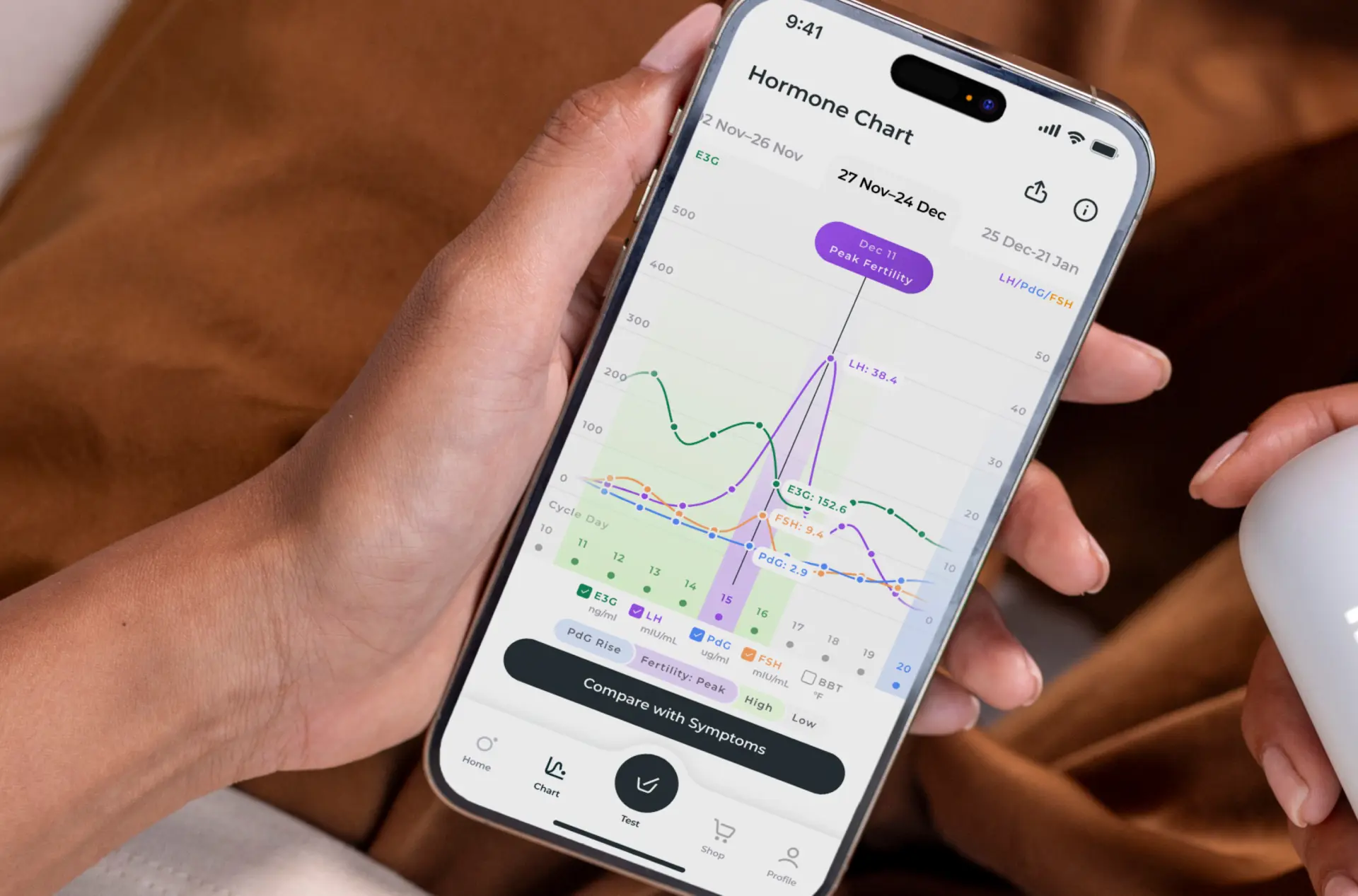Content table
It’s frustrating to be gaining weight and not be able to understand why. You haven’t made any dietary or exercise changes, yet the number on your scale is rising.
Chemical signals like progesterone could be telling your body to put on the pounds despite your good habits.
Let’s answer the question: Does Progesterone Cause Weight Gain?
Progesterone levels, along with estrogen, change throughout every woman’s life. You’ve probably felt peaks and troughs in these hormones through familiar symptoms.
Do you notice loose stool during your period?
You can thank high progesterone levels for that.
And the fluid retention during your period?
Also from progesterone.
But progesterone doesn’t just cause uncomfortable symptoms around your period.
It’s also responsible for preventing miscarriage during pregnancy.
Without progesterone, the uterus can’t maintain a pregnancy. Some women may even supplement progesterone if their bodies aren’t creating enough.
More on that later.
First, let’s talk about whether progesterone and weight gain are linked.
Does progesterone cause weight gain?
Progesterone doesn’t directly control weight. Changes in progesterone levels can cause weight fluctuations.
Progesterone interacts with other hormones, especially estrogen, to create balance in the body.
Estrogen is responsible for helping us store energy as fat in the body. It also helps us retain salt and water.
Progesterone goes in the other direction. It helps us burn fat as energy and release water and salts in urine.
Estrogen and progesterone have an inverse relationship. This means that when one of them is high, the other is low.
When they’re in equilibrium, they can balance the effects of one another. Think of a see-saw with equal weights on each side. They each keep the other in check.
For instance, in some tissues, progesterone helps to limit the function of estrogen receptors. So even though estrogen may be high, progesterone stops it from having too much effect.
But when your body doesn’t have enough progesterone, estrogen goes unchecked.
Clinicians and researchers sometimes call this phenomenon ‘estrogen dominance’.
It’s when progesterone no longer has control over estrogen. And it can lead to changes in where we store fat, as well as how much fat we keep in our bodies.
Can low progesterone cause weight gain?
Yes. There are a few ways that low progesterone can cause you to gain weight.
Polycystic Ovary Syndrome and Insulin Resistance:
Having too little progesterone can change your body’s ability to regulate sugar levels. Usually insulin controls the amount of sugar in our blood.
But low progesterone can cause insulin resistance. This causes blood sugar to rise, and it’s linked to Polycystic Ovary Syndrome (PCOS).
PCOS is associated with weight gain, as well as other uncomfortable symptoms for women. Check out our guide on getting pregnant with PCOS to learn about healthy ways to mitigate symptoms.
Hypothyroidism
When progesterone is lower than estrogen, our bodies create more Thyroid Binding Globulin (TBG). This protein stops another important hormone from doing its job: thyroid hormone.
This can be confusing, since levels of thyroid hormone may not change. But because TBG stops thyroid hormone from working, symptoms of hypothyroidism can result. This can look like weight gain and fatigue.
But low progesterone doesn’t just affect your weight. Women without enough progesterone also have trouble getting and staying pregnant.
For more information about low progesterone, see our complete guide on low PdG. But could changes in your progesterone levels account for changes in your weight? Let’s talk about it.
Can high progesterone cause weight gain?
Yes again. Hormones are all about balance. So having too much progesterone isn’t a good thing for weight either.
Progesterone and estrogen have opposing effects on appetite. Estrogen helps decrease your hunger and food cravings. Progesterone can make you feel like you can’t live without that 2:00 am ice cream.
If your progesterone levels are too high, you may notice yourself eating more than you used to.
These habit changes can lead to weight gain. But what about when your habits haven’t changed, but your body is going through big changes because of pregnancy or menopause?
Does progesterone cause weight gain during pregnancy?
Higher progesterone levels are associated with more weight gain in pregnant women.
But remember that it’s normal to gain weight while you’re creating new life. The Institute of Medicine says that gaining between 25 and 35 pounds during pregnancy is normal.
Now lets talk about weight gain during another major transition for your body: menopause.
Does progesterone cause weight gain after menopause?
Progesterone can contribute to weight gain during and after menopause. Gaining weight is a common symptom of the menopause transition. Women in their late 40s and early 50s may find themselves losing muscle mass while putting on weight.
When we think about menopause, we often associate it with a drop in estrogen. But progesterone also drops off, and can contribute to weight changes. So how can you know if your progesterone levels are changing?
How to track progesterone?
There are a few ways to track your progesterone. Some of these are done at home and some through your doctor or clinic.
At-Home PdG tests
You can learn about your monthly progesterone metabolite PdG fluctuations with easy at-home test kits. These kits use your urine to track progesterone metabolite PdG levels.
A fertility monitor like Inito tracks PdG (urine metabolite of progesterone) levels to confirm ovulation. By watching PdG rise in your luteal phase, you can have confidence that you’ve ovulated in this cycle.
At-home testing is a great option if your goal is to get pregnant quickly. Bt if you’re worried about problems with getting pregnant, or gaining weight, you should see your doctor. They may recommend clinic tests as well.
Clinic testing for progesterone
Supplementing Progesterone: Your questions, answered
Women with low progesterone may wonder if it’s possible to take progesterone medication. Progesterone pills are prescribed by your gynecologist, and they come with risks and side effects. They’re prescribed for different reasons, such as birth control, pregnancy sustenance, and menopause.
Here are some of the most common questions about taking progesterone.
What are the side effects of taking progesterone?
Check out the most common side effects of progesterone supplementation:
- Abdominal cramping
- Breast tenderness
- Back pain
- Dizziness
- Low blood pressure
- Blood clotting
- Vaginal bleeding
Your doctor should let you know about these side effects before you start taking progesterone. These are generally not serious, but let your provider know about any changes that worry you.
Will I lose weight on progesterone?
If you have low progesterone, supplementing may help with weight loss. Some scholars have even called progesterone a “weight watcher’s pill” for this reason. This may be a good option for women who are suffering from bodily changes related to menopause.
But progesterone itself can cause weight changes. Let’s talk about them.
Will I gain weight on progesterone?
Maybe. Women who are still in their reproductive years may take progesterone in birth control pills.
There’s some evidence that these women experience weight gain associated with progesterone.
But we’re still not totally sure that progesterone causes weight gain in these women. Let’s talk about why this is.
Why does the progesterone pill cause weight gain?
We’re still not totally sure that the progesterone pill does cause weight gain. But if it does, it could be because of changes to women’s appetite because of increased progesterone.
Will I lose weight after stopping progesterone?
Maybe, but probably not much. In trials, women who take progesterone didn’t gain or lose very much weight at all in comparison to other women.
Summing Up Progesterone and Weight Gain
Your hormones work together to create balance in the body. Progesterone and estrogen balance the effects of each other.
Progesterone has an indirect effect on weight gain. Having too little, or even too much progesterone can cause changes in how you store energy.
You can track your PdG at home using Inito. Your doctor may also recommend blood progesterone testing.
If your progesterone levels are low, supplementing progesterone may be a good option after discussing with your doctor.
Was this article helpful?
- Ain KB, Mori Y, Refetoff S. Reduced clearance rate of thyroxine-binding globulin (TBG) with increased sialylation: a mechanism for estrogen-induced elevation of serum TBG concentration. J Clin Endocrinol Metab. 1987 Oct;65(4):689-96. doi: 10.1210/jcem-65-4-689. PMID: 3116030.
- Apgar BS, Greenberg G. Using progestins in clinical practice. Am Fam Physician. 2000 Oct 15;62(8):1839-46, 1849-50. PMID: 11057840.
- Bouchard, T. P., Fehring, R. J., & Schneider, M. (2019). Pilot Evaluation of a New Urine Progesterone Test to Confirm Ovulation in Women Using a Fertility Monitor. Frontiers in public health, 7, 184. https://doi.org/10.3389/fpubh.2019.00184
- Cable JK, Grider MH. Physiology, Progesterone. [Updated 2021 May 9]. In: StatPearls [Internet]. Treasure Island (FL): StatPearls Publishing; 2022 Jan-. Available from: https://www.ncbi.nlm.nih.gov/books/NBK558960/
- Faas, M. M., Melgert, B. N., & de Vos, P. (2010). A Brief Review on How Pregnancy and Sex Hormones Interfere with Taste and Food Intake. Chemosensory perception, 3(1), 51–56. https://doi.org/10.1007/s12078-009-9061-5
- Grantham, J. P., & Henneberg, M. (2014). The estrogen hypothesis of obesity. PLoS ONE, 9(6). https://doi.org/10.1371/journal.pone.0099776
- Gold E. B. (2011). The timing of the age at which natural menopause occurs. Obstetrics and gynecology clinics of North America, 38(3), 425–440. https://doi.org/10.1016/j.ogc.2011.05.002
- Lof M, Hilakivi-Clarke L, Sandin S S, de Assis S, Yu W, Weiderpass E. Dietary fat intake and gestational weight gain in relation to estradiol and progesterone plasma levels during pregnancy: a longitudinal study in Swedish women. BMC Womens Health. 2009 Apr 30;9:10. doi: 10.1186/1472-6874-9-10. PMID: 19402915; PMCID: PMC2685772.
- Lopez, L. M., Edelman, A., Chen, M., Otterness, C., Trussell, J., & Helmerhorst, F. M. (2013). Progestin-only contraceptives: effects on weight. The Cochrane database of systematic reviews, 7(7), CD008815. https://doi.org/10.1002/14651858.CD008815.pub3
- Menopause: Age, stages, signs, symptoms & treatment. Cleveland Clinic. (2021, May 10). Retrieved May 9, 2022, from https://my.clevelandclinic.org/health/diseases/21841-menopause#:~:text=Menopause
- Northwestern Medicine. (n.d.). Beyond cramps. Northwestern Medicine. Retrieved May 9, 2022, from https://www.nm.org/healthbeat/healthy-tips/quick-dose-beyond-cramps
- Patel S, Homaei A, Raju AB, Meher BR. Estrogen: The necessary evil for human health, and ways to tame it. Biomed Pharmacother. 2018 Jun;102:403-411. doi: 10.1016/j.biopha.2018.03.078. Epub 2018 Mar 22. PMID: 29573619.
- Prior J. C. (2011). Progesterone for Symptomatic Perimenopause Treatment – Progesterone politics, physiology and potential for perimenopause. Facts, views & vision in ObGyn, 3(2), 109–120.
- Saran, S., Gupta, B. S., Philip, R., Singh, K. S., Bende, S. A., Agroiya, P., & Agrawal, P. (2016). Effect of hypothyroidism on female reproductive hormones. Indian journal of endocrinology and metabolism, 20(1), 108–113. https://doi.org/10.4103/2230-8210.172245
- Stachenfeld N. S. (2008). Sex hormone effects on body fluid regulation. Exercise and sport sciences reviews, 36(3), 152–159. https://doi.org/10.1097/JES.0b013e31817be928
- Yaktine, A. L., Rasmussen, K. M., Rasmussen, K. M., & Yaktine, A. L. (2009). Weight gain during pregnancy: Reexamining the guidelines. National Academies Press.












